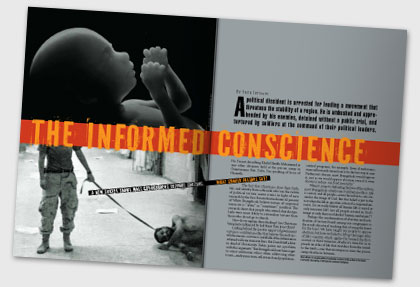The Informed Conscience
Skye Jethani May/June 2010
A political dissident is arrested for leading a movement that threatens the stability of a region. He is ambushed and apprehended by his enemies, detained without a public trial, and tortured by soldiers at the command of their political leaders.
No, I’m not describing Khalid Sheikh Mohammed or any other detainee held at the prison camp in Guantanamo Bay, Cuba. I’m speaking of Jesus of Nazareth.
The fact that Christians draw their faith, life, and identity from a Messiah who was the victim of political torture seems ironic in light of new research by the Pew Forum that indicates 62 percent of White Evangelicals believe torture of suspected terrorists is “often” or “sometimes” justified. The research shows that people who attend church regularly were more likely to rationalize torture than those who do not go to church.
How do we explain these findings? Are Christians being more influenced by Jack Bauer than Jesus Christ?
Lurking behind this passive support of government torture is a utilitarian ethic that believes the ends justify the means—torture is justifiable if the information attained will save innocent lives. But David Neff, editor in chief of Christianity Today, points out a problem with this argument: “But Evangelicals have been eager to reject utilitarian ethics when addressing other issues—embryonic stem-cell research and population-control programs, for example. Even if embryonic stem-cell research turned out to be the best way to cure Parkinson’s disease, most Evangelicals would oppose it, just as we would oppose abortion even if it were shown to reduce, say, food insecurity.”
When it comes to defending the lives of the unborn, most Evangelicals utterly reject utilitarian ethics. Life is sacred, and all people—even the unborn—are created in the image of God. But this belief is put to the test when the life in question is that of a suspected terrorist. Do we really believe all human life is sacred or only innocent life? Are all people created in God’s image or only those not labeled “enemy combatants”?
Perhaps the condemnation of abortion and justification of torture found among our congregants is the result of pastoral teaching that is losing the forest for the trees. We have taught our people to oppose abortion, but have we failed to lift up the larger ethic of life’s sanctity, which applies far beyond the first, second, or third trimester. Maybe it’s time for us to preach an ethic of life that stretches from the womb to the tomb—one that encompasses even the prison camps that lie in between.